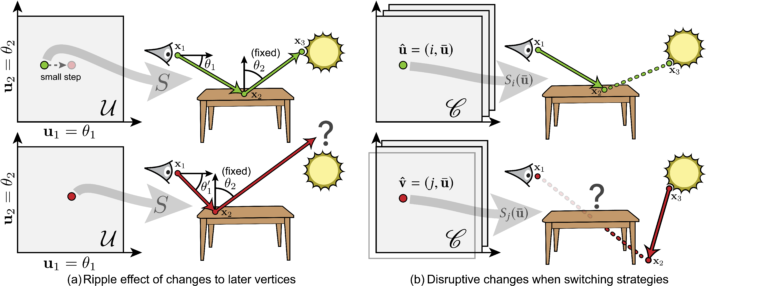Reversible Jump Metropolis Light Transport using Inverse Mappings
We investigate how to generalize this concept to non-invertible sampling techniques commonly found in practice, and introduce probabilistic inverses that extend our perturbation to cover most sampling methods found in light transport simulations.
January 31, 2018
ACM Transactions on Graphics (TOG) 2018
Authors
Benedikt Bitterli (Disney Research/ETH Joint B.Sc./Dartmouth College)
Wenzel Jakob (EPFL)
Jan Novak (Disney Research)
Wojciech Jarosz (Disney Research/Dartmouth College)
Reversible Jump Metropolis Light Transport using Inverse Mappings
We study Markov Chain Monte Carlo (MCMC) methods operating in primary sample space and their interactions with multiple sampling techniques. We observe that incorporating the sampling technique into the state of the Markov Chain, as done in Multiplexed Metropolis Light Transport (MMLT), impedes the ability of the chain to properly explore the path space, as transitions between sampling techniques lead to disruptive alterations of path samples. To address this issue, we reformulate Multiplexed MLT in the Reversible Jump MCMC framework (RJMCMC) and introduce inverse sampling techniques that turn light paths into the random numbers that would produce them. This allows us to formulate a novel perturbation that can locally transition between sampling techniques without changing the geometry of the path, and we derive the correct acceptance probability using RJMCMC. We investigate how to generalize this concept to non-invertible sampling techniques commonly found in practice, and introduce probabilistic inverses that extend our perturbation to cover most sampling methods found in light transport simulations. Our theory reconciles the inverses with RJMCMC yielding an unbiased algorithm, which we call Reversible Jump MLT (RJMLT). We verify the correctness of our implementation in canonical and practical scenarios and demonstrate improved temporal coherence, decrease in structured artifacts, and faster convergence on a wide variety of scenes.

